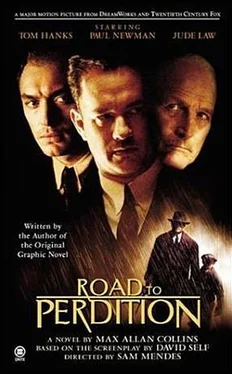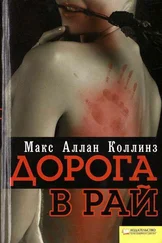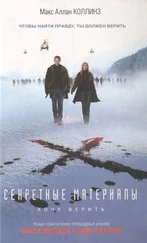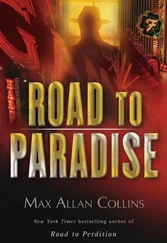Maguire, back in his Chicago flat, hung up the phone, after telling Nitti “this might take some time.”
He returned to what he’d been doing — not work in his darkroom, for a change, rather a wall map he’d tacked up in his living room, removing a few of his framed death photos to make space. He had already indicated which midwestern banks held Capone money with a bold red dollar sign.
Now he used red thumbtacks to show which banks had already been robbed. Once that was done, he traced between the red dots with a spread forefinger and thumb; try as he might, the photographer could find no pattern. Which of course was a pattern in itself, just not a very useful one.
He spent the rest of the evening deep in thought, even as he cleaned the lenses of his cameras with methodical precision, and then identified — and studied — the photos he’d taken inside the O’Sullivan house, when he and other mourners had dropped by to give their condolences.
Then Maguire went back to his wall map, looking at each bank that had not yet been robbed, as he rolled a cigarette, licking the paper, finally firing up with a golden lighter. Still seeing nothing, he walked away, doing make-work, like replacing the bulbs in his carrying case... and adding bullets to a secret compartment in the camera he’d carried into the diner a few weeks ago.
He poured himself a glass of whiskey, smiling bitterly at the thought of O’Sullivan playing drunk, fooling him, making a patsy of him. Sipping the liquid, he idly, almost unconsciously, shot off flashbulbs with his other hand, as he sat on his couch and looked at the map on the wall... studying the nonpattern of O’Sullivan’s trail amid the lightning-like bulb bursts.
They had robbed their fifth bank — in Loose Creek, Missouri — this morning; it was evening and the father and son were in a small family restaurant in Farmington, Iowa. The place had a homey feel — a few booths, more tables, picnic-style tablecloths, curtains on the windows, the light soft and warm and yellow.
O’Sullivan and his son sat at a small table near an improvised dance floor, where a couple of couples danced to the radio — right now that new jazz singer, Bing Crosby, was singing “Where the Blue of the Night Meets the Gold of the Day.” The singer’s warm voice, his casual style, pleased O’Sullivan. Both he and his boy were having the meat loaf with mashed potatoes and creamed corn; both ate heartily.
Their waitress — whose name BETTY was stitched on her neck-high apron — freshened O’Sullivan’s coffee. She was probably forty, a slender brunette with dark red lipstick, though not heavily made up. A nice girl. Nice woman.
She noticed him looking her over, and their eyes met, and hers told his she didn’t mind the friendly onceover.
“What brings you boys to the middle of nowhere?” she asked.
Michael, turning a piece of white bread brown by mopping up gravy, said brightly, “We’re bank robbers!”
His father gave him a look, but Betty just laughed. “If so, there are nicer places for men with money to eat!”
“In Farmington?” O’Sullivan asked.
She laughed again. “Well, you got me there.”
“We’re just traveling through.”
“On your way somewhere?”
“That’s right.”
She accepted this nonanswer with another smile, and he watched as she headed behind the counter, taking off her apron. The restaurant was about to close.
His plate clean, Michael pushed it forward and, as if inquiring about dessert, asked, “So — when do I get my share of the money?”
O’Sullivan thought about that. “How much do you want?”
The boy clearly hadn’t expected such an open-ended response, and O’Sullivan watched with amusement as his son’s face registered the effort to come up with a suitably high, but not outrageous, figure.
“Two hundred dollars,” the boy said, firmly.
“That’s a lot of moolah.”
“I coulda asked for half. But I figure you got the hardest job. You’re the brains of the outfit.”
O’Sullivan shrugged. “Doesn’t say much for the outfit. Okay — two hundred it is.”
Michael frowned. “I coulda had more, couldn’t I?”
O’Sullivan sipped his coffee. “I guess you’ll never know.”
One of the dancers went over to the console radio and turned it up, not long before Crosby came to his big finish, the music swelling.
Working his voice up over this pleasant racket, Michael said, “I gotta go to the bathroom.”
“What?” his father asked, innocently.
“I gotta go to the... ” And the music stopped, but Michael blurted on: “... bathroom! ”
His voice seemed to echo through the room, and the boy covered his mouth, embarrassed but grinning, as the patrons and dancers laughed and smiled.
“You’re only human,” O’Sullivan said. “Go on. Go.”
Michael left the table, and Betty walked over — not a waitress now, just an attractive woman, who’d been watching O’Sullivan from across the room (he’d noticed).
“Hi again,” she said.
“Hello. Closing up?”
“’Bout that time. You fellas ate kinda late.”
“You know how it is when you’re on the road. Trying to make time.”
She smiled, and he realized what he’d said; he hadn’t intended the double entendre, and felt almost as embarrassed as his son had.
“I can get you another cup,” she said, nodding to his coffee.
“Thanks. But aren’t you off work now?”
“Yeah, but... I don’t like going straight home. House is empty since... Maybe I oughta get a cat.”
O’Sullivan smiled, wondering if it was a divorce or if death had taken someone from her, too.
She brought over the coffee pitcher, topped off his cup, then took the chair next to O’Sullivan, leaned an elbow on the table, her chin on her hand. Her eyes were hazel — as lovely as they were sad. “You men traveling alone?”
O’Sullivan nodded, sipped his coffee. “His mother passed away, not long ago. My wife, I should say.”
Her eyes tightened. “Oh... gee, I’m so sorry.”
“We’re just driving through, you know?”
A new song started up on the radio — Kate Smith, singing “Dream a Little Dream of Me.”
“Oh, I just love this song,” Betty said.
“Nice song. Nice voice.”
“Oh yeah... Funny, doesn’t matter how long I been on my feet, I can always make these dogs get up and dance. I just love to dance... Would you like to? Dance?”
She looked just enough like Annie to tempt him; but too much like Annie for him to say yes.
Gently, he turned her down: “I don’t think so.”
“Okay. Too soon?”
He swallowed. Nodded. “Too soon.”
“I understand. Really I do.”
“But, Betty... ”
“Yes?”
“Thank you.”
Michael was walking back toward the table. The boy watched his father and the waitress sitting, listening to the music, smiling at each other. It made him think of his mother, and that made him sad... but it was nice to see his father smiling just the same.
They drove a few hours, and took a motel in another Iowa town, Muscatine, on the Mississippi River, at a motor court that was awfully shabby for a couple of bank robbers in the money.
In the room, before bed, Papa counted the “take” (as he called it), removing the packets of cash one at a time from the black satchel. Michael took his two hundred dollars and sat like an Indian on the bed and counted it over and over.
“Are we rich, Papa?”
As he counted the bundles of cash, Papa said, “No, son. We’re very poor.”
“But, Papa — so much money!”
“Without your mother and brother, there can never be true prosperity.”
The boy thought about that, but it still looked like a lot of loot to him.
Читать дальше












